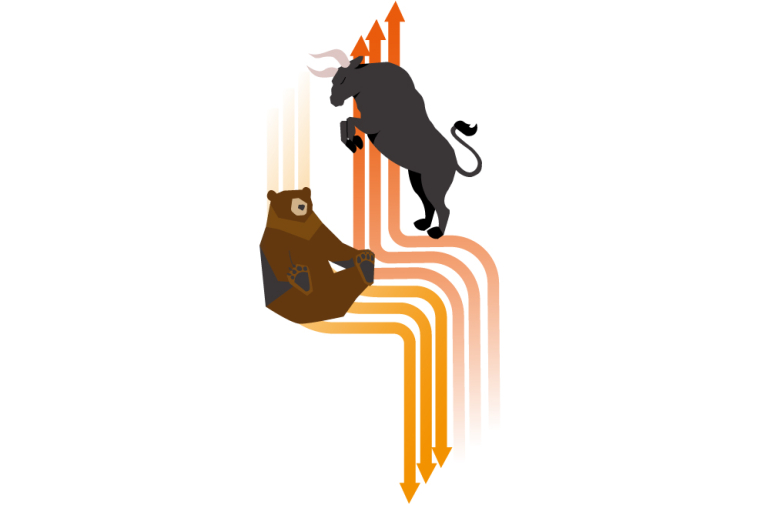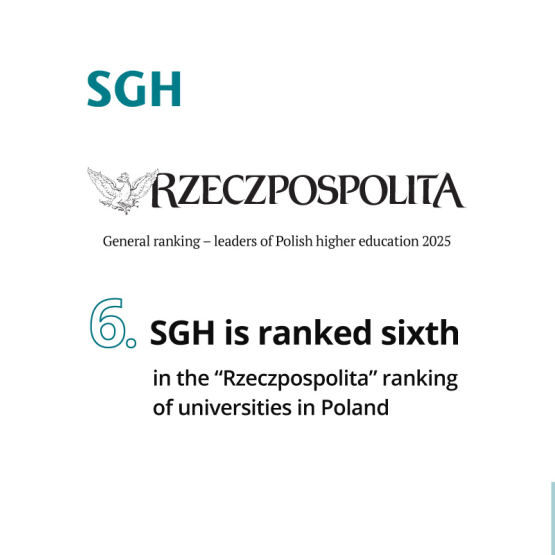
Anyone who suffers deeply over every loss and spends sleepless nights because of it, should never engage in this business - says dr Wiesław Rozłucki, the co-founder of the Warsaw Stock Exchange, the first Chairman of its Management Board in 1991-2006, doctor honoris causa of SGH and SGPiS alumnus.
Kamil Gemra: Mister Chairman, it will soon have been 33 years since the first stock exchange trading session took place. Do you remember that day and the emotions you felt? How did you manage to pull off such a success?
Wiesław Rozłucki: To tell the truth, I remember that day more than any other of the following events on the stock exchange. This fact had historical implications. The first trading session after 52 years. The market and the stock exchange started determining the value of Polish companies. For 50 years the stock market had been absent from our lives, so launching the stock exchange was a big thing. How did it come about? Full-blown preparations continued all throughout 1990 and in the first quarter of 1991. It should be borne in mind that launching the stock exchange was an important part of the economic transformation, i.e. the Balcerowicz Plan. Yet, that project was unique. The entire Balcerowicz Plan was about stimulating the primary free market forces which worked bottom-up, but the capital market came into being differently, it was created in a top-down process by the government. In 1990 a heated debate was going on in Poland about when the capital market should be restored. There were many influential people advocating strongly for relying on pure market forces and believing that individual entrepreneurs should be setting up their own exchanges which would then get professionalised over time. The other school of thought supported the creation of a complete, modern infrastructure for which private capital was not prepared, thus it was supposed to be a job of the government to see through. The original plan provided for the stock exchange to go into private hands in due course. This had never actually happened. We built the entire infrastructure - the stock exchange, the National Securities Depository and the Securities Commission. This market infrastructure was not intended to be some original, Poland-specific system, it copied foreign models of the time, occasionally implementing some insights about the future.
Was it as simple as that?
Certainly not. For instance, in the neighbouring Czechoslovakia an altogether different model of a general voucher privatisation was adopted. The stock exchange was completely non-existent in the government agenda. In our Polish model of privatisation, particularly for large enterprises, the capital market played a crucial role. Establishing a modern infrastructure, targeted at the mass shareholding, constituted this specifically Polish strategy which was not employed in any other post-communist country.
Please explain how it actually worked.
Frequently, assets were sold either to strategic investors or in the voucher privatisation which was quickly taken over by the so called strong hands, so no general participation of the wide public was assumed in this process of privatisation. Our stock exchange had to be built very fast. Privatisation had already begun. It was important to establish the stock exchange, so that the first IPOs which took place at the turn of 1990 and 1991 could go to the secondary market, and this happened on 16 April 1991 in the form of the first stock exchange listing. The stock exchange was built in the simplest form possible, its trading sessions took place once a week. In its first year the trading system was based on single price auctions once a day. Such a simple architecture was due to the telecommunications system in Poland which made continuous trading infeasible and investors could not place orders during the trading sessions. Well, maybe some of them could, but an average investor did not have such tools. We wanted a simple, easy and equal access to the market. One more thing - the market was order-driven. In Europe it was rather common, however on the biggest European market in London the trading was driven by prices. There were the “market makers”, a bit like Polish currency exchange offices - no negotiation was possible, just the bid and sell price which fluctuated during the day. We did not take this path, and for a good reason. Later on, this Continental European system driven by orders became widespread across the entire Europe, it was also adopted in London, so we were right to go for this model. I believe it to be the stock exchange’s DNA - a simple market, open to all, modern and properly supervised. These were the right parameters for the capital market.
And if we could once more take this historical angle, can you name two or three key events after the stock exchange had been launched, that have the greatest impact on its today’s form?
I would say, certainly 1993 and 1994, the overheating bull market which should actually be classified as a stock market bubble. Prices grew over a dozen times, that was the time when Bank Śląski went public, the issue was heavily oversubscribed due to extremely high demand. Share subscriptions were at their historical highest of 830 thousand. It has never happened since then. Another such record was broken by the public offer of the Warsaw Stock Exchange itself in the autumn of 2010, amounting to 320 subscriptions.
The Stock Exchange became highly popular then. This is a standard stock exchange mechanism: when something is very popular, the price keeps growing because everyone wants to buy. A price that grows is not the public offering price, but the first stock exchange price. It is only a matter of time when the bubble bursts, leaving everyone disappointed. Naturally, those who had sold earlier, felt happy, but those left with shares on their hands had to wait another couple of years to make a profit. Yet, it must be stated there was no one who made a loss on that offer. Today, in casual conversations, people often like to call it a scandal because prices were high and then took a sudden tumble. I believe it was only a matter of how much you managed to earn on this offer, no losses were recorded, nevertheless many were left disconcerted.
Any other significant developments you can recall?
Most importantly, the stock exchange did not collapse after the bubble, it was more like a baptism of fire. Starting from 1994, the number of listed companies began to rocket. During the first years there were too few companies on the stock market, which ultimately led to the creation of a speculative bubble. However, after the bubble burst in 1994 and 1995, the stock exchange experienced its golden years. In the years 1997-1998 about 100 new companies got floated in one year. Compared with today’s data, it seems unbelievable. Another important development which spurred hope for a mass participation of investors was the General Privatisation Programme. The programme took a long time to design in 1996 and 1997. The share certificates went into circulation, but in reality potential risks overshadowed the gains. Finally, neither did the risks nor the privatisation potential gains materialise. In hindsight, it was a non-event type of thing.
The year 1998 when we started listing derivatives was way more meaningful. In retrospect, it was the right decision to start from futures contracts on WIG20 index, even though other markets’ experiences were not consistently positive. Some started from options, others from futures markets. For about two years I kept enquiring other stock markets about where we should begin. They recommended starting from futures, as these were easier to handle and understand, so we followed the advice.
In subsequent years this market of derivatives, particularly futures contracts, was extremely popular.
It was the only market which was truly active in post-communist countries. No other stock exchange was able to launch a market with a sufficient scope of liquidity. I still believe it to be a great achievement. Today, futures contracts have lost their appeal, but for at least a decade they constituted one of the pillars of the stock exchange trading and were frequently used by investors. According to me, the launch of the Warset system in 2000 was also crucial. It was a highly advanced trading system which, unlike its predecessors, allowed brokers to operate remotely. The stock exchange opened to brokerage houses and banks which did not have to be located on the stock exchange premises, or even in our country.
The stock exchange became international in 2000 and in the same year outperformed Vienna in all three important categories: the number of listed companies, stock exchange capitalisation and daily stock trading. After 10 years we managed to get ahead of the Vienna stock exchange which had been working practically uninterrupted since the 18th century. It demonstrated the robustness of our market and promised a great growth potential.
When did this momentum ease down?
I think this growth impetus of the Warsaw Stock Exchange started slowing down in the second decade of our century, so after 2010. The stock market capitalisation, being the value of all domestic companies versus the GDP, started to deteriorate. In 2007 the market capitalisation of domestic companies accounted still for 40% of the Polish GDP. Today it is at 20%-25%, which shows that the valuation of Polish firms does not keep pace with the economic growth. If we compare our WIG20 index, we can see that for the last 5, 10 or even 15 years it has been trailing behind other European indices.
When I started studying at SGH in 2006, everyone was into stock exchange investing. At SGH entrance there was a stock ticker, sponsored by one of the brokerage houses, where the stock exchange listings could be tracked, as if investing was the number one thing in life. Back then, it was a real bull market which hit the roof in 2007. Nowadays, things have changed immensely. Students can choose form a multitude of varied investment opportunities, including putting their money in crypto-assets and launching start-ups.
Well, sorry to say this, but start-ups are no longer the flavour of the month. Crypto-currencies, on the other hand, look quite promising.
What is the root cause of this situation? What should be done in order to boost the interest of SGH students and individual investors in the stock exchange?
My advice is simple, yet hard to put into effect. The purpose of the stock exchange is for to investors and issuers to make money. When valuations are low, it means share prices are not rising, so investors who acquired these shares in the long term will not make a profit, and with inflation running high, they may even incur losses. Therefore, it should come as no surprise that both students and individual investors have felt disappointed with the bear market of the last years. And it is not about the stock market offerings being unappealing. There are numerous companies to choose from, for instance some gaming businesses. That used to be a strongly bullish segment which even now remains popular. Yet, that is not true of the entire stock market. If only the shares of other companies could keep up the pace!
When I meet people these days, they say: “Mister Chairman, in your time the shares were always on the rise”. Well, that is not quite true. But, when the shares started falling then, everyone somehow thought the trend was temporary and expected prices to bounce back soon. It somehow usually came true in those days, but not any more. When I was leaving the stock exchange in 2006, the WIG20 index exceeded 3000 and reached 3800 soon after. Nowadays, a bull market is announced when it gets to 2300. It shows how difficult it currently is to make a profit on the stock exchange.
The same applies to issuers.
Definitely. When valuations are low due to relatively low prices in IPOs, many issuers seek to leave the Warsaw Stock Exchange. Actually, for a few years now the number of companies quitting has been higher than the number of IPOs.
How is that?
No economic development is triggered by one factor solely. To my mind, we should first consider the situation of companies of the State Treasury, particularly as their volumes dominate WIG20, but their valuations are several dozen per cent lower than their counterparts in Western countries. Even when these companies turn a profit, their multiplier, price to earnings are lower. Why is that? I tend to think that our corporate governance has a lot of room for improvement.
What do you mean? Can you expand on that?
I have always believed that the core purpose of any company management is to deliver on its business goals, i.e. to maximise shareholder value. This was even put into the first Warsaw Stock Exchange “Good Practices” in 2002 as a key objective. Over the last eight years, I have frequently heard that the key purpose of the state-run companies’ management bodies was to implement the programme of the winning political party, which created an alternative corporate governance model at the service of various partisan interests. Maximising value and delivering on business goals was put aside and that inevitably pushed the valuations down. Each company’s valuation always accounts for future forecasts. Forecasting the future of such state-run companies may lead to a conclusion that there is a certain likelihood of such organisations pursuing partisan interests, instead of focusing on profit maximisation. Alternatively, successful companies may have some additional tax burdens imposed on them. In recent years the stock market has been viewed not as a tool of stimulating economic growth, but a source of budget revenue to ensure the financing of social transfers. Thus, investors have grown aware of the risks involved in state-owned companies engaging in meeting other than business goals. If a company is perceived as high-risk, its valuation will slump.
What about other companies that can be interesting investment targets?
I keep asking myself the same question. The answer may be that when other privately-owned companies watch those really big, state-run firms operate under “alternative corporate governance”, they may question whether it is reasonable to go an extra mile and bear the cost of complying with all the tight regulatory requirements. Moreover, Polish companies are a few time smaller than those on Western stock exchanges, but most regulations are set at the European level. This means additional costs. Big companies can bear the brunt, but smaller organisations will often crack. I think we should fight in the European institutions to reduce the costs of compliance with regulatory requirements for small companies, even when they are listed on the main markets.
Mister Chairman, our interview is held one day before you receive the title of doctor honoris causa from SGH. What is your take on the impact SGH has exerted on capital market professionals, potential investors and issuers?
I believe this impact to be highly significant. To justify this view, I would like to recall my own career path, as I have been frequently asked how my interest in the stock market started. It all began while I was still a student. My university years were in 1965-1970 when the stock exchange was more of a forbidden fruit. According to the government authorities back then, it was a sign of “rotten” capitalism, reinforced with television images of stock market crashes leading to citizens losing all their money and going off their minds. It was presented as an anti-model of the economy. Despite that, I had always been fascinated by the stock exchange. During my student days in the Foreign Trade Department I took a course titled Foreign Trade Organisation and Techniques. One of the reluctantly discussed topics was the operations of commodity exchanges, particularly using futures contracts. I can still remember about 200 of my fellow students in the Foreign Trade Department resenting of this topic which they found overtly incomprehensible and abstract, so nobody was into it.
What about you?
I was determined to find out about the economic reality of a farmer who could sell his crops before they were harvested at a previously fixed price. It really got me interested. So much so, that when I first travelled to the West in 1968, I visited the London Stock Exchange, and experienced the excitement of watching it in action. It can be concluded that even at that difficult time, SGPiS curriculum offered a highly professional and non-political course where students could learn the intricacies of foreign trade.
What about the role of SGH in disseminating the economic knowledge?
When I was a student, there were merely four departments. It was only the Foreign Trade Department that conducted research into international trade exchanges. The other focused on finance and statistics, production efficiency and domestic trade, so their interests were constrained locally to Poland and did not explore the world economy. Nowadays, it is hard to imagine large scale business operations in Poland without some awareness of the global economy and its impacts.
To my mind, it is this type of economic knowledge, concentrated on the global economy, that is absolutely necessary to understand own domestic economy. I can also confirm that during the first years of the stock exchange students were the most engaged group of stock investors. Among all professional groups, such as office workers, manual workers, farmers, etc., students were at the forefront of those interested in the stock market.
What do you think was the reason?
Stock market investments do not require high capital outlays, the required minimum on the Polish stock market was very low. For students, the nature of the stock market being a bit of a gamble posed an intellectual challenge. Still, some solid rudimentary knowledge counted. It could help, with varying accuracy, make forecasts about future trends. In the games of chance forecasting makes no sense, however it is possible to make accurate forecasts on the stock market and with it comes a monetary reward.
The same logic applies to business ventures, yet starting a company, even launching a start-up, requires sufficient capital or at least some outstanding idea which can immediately attract financing. It is not easy, some own or loan capital is necessary. On the stock market, you can start some small investments with a few thousand złotys on hand and check the accuracy of your forecasts, see how anxious you get when you lose money, whether you are fit for this type of business. People who suffer over every loss and spend sleepless nights because of it, should never engage in the stock market.
2024 has been established in Poland the Year of Economic Education. Please conclude, how important is the economic education of our society in terms of stock market operations and basic economic knowledge, two strongly intertwined fields?
This brings me to the origins of the Polish stock exchange again. To us who created the stock exchange and managed it, education was crucial. It was equally important to the trading techniques because we wanted the stock market to be treated as a natural thing.
Just as going shopping for groceries, we wanted people to be visiting brokerage houses and investing their money. We strongly advised people never to invest most of their money in the stock market. The other important reason was that this initial education was supposed to gain the trust of investors. Trust was not about the assurance that an investment always meant a gain. Trust was about the transparency of the stock market trading. It was about the acquired shares appearing on the client’s account and about receiving cash every time the client disposed of the stock. It meant some firm and unbreakable rules. Trust is necessary for investors to get assurance that the rules of the game are fair, although the game outcome may be uncertain. There needs to be a level playing field for everyone, with no preferential treatment or terms.
These are really high standards and principles.
They are indeed. Today, when I look at the economic education levels of the Polish society, not necessarily related to the stock market, they strike me as shockingly low. Some surveys have found out that about a half of people in Poland are unable to calculate the percentage, not to mention the compound interest. This is the primary school level competence! Maybe the school teaches percentage calculation, but not for the purpose of managing a bank loan, which, as a consequence in real-life, causes many misunderstandings and complaints from banking services users. Nowadays, in some bank loan situations, using the Swiss franc or the złoty, when WIBOR is questioned, the paradigm changes. A consumer who has borrowed the money complains about not having been informed that WIBOR might rise, or about not knowing interest will be charged. Not possessing such knowledge or pretending not to have it starts to be risky.
Due to this status quo, banks increasingly start to treat their clients as consumers who potentially have no knowledge at all. Fortunately, on the capital market investors are expected to be able to anticipate the involved risks. Should this no-knowledge trend, God forbid, extend to the capital market, then every loss, being an inherent part of capital market dealings, may give rise to a court litigation.
Recent developments in the banking sector point out either to extremely scarce economic knowledge or to the cases when the lack of knowledge is used as an excuse by law firms specialising in seeking legal redress.
Therefore, I believe the Year of Economic Education to be of utmost importance. This education should be also diversified according to age groups. Older clients should be educated about our banking and insurance infrastructure as they frequently feel irrationally suspicious of those institutions. For the young generation sky seems to be the limit. Most of them invest using mobile banking and can naturally close deals. What they may need is the education helping them develop the skill of discriminating true and fake information on the Internet.
Thank you for your time.
DR KAMIL GEMRA, Digital Finance FINTECH Unit, SGH Collegium of Business Administration



